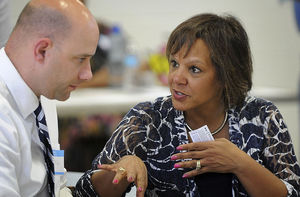Jon Krenek
[email protected]
Lorenzo R. Smith Elementary School will become the nation’s first food hub selling locally-grown food to distributors and providing the school with both free and low-cost produce for school lunches.
The transformation comes thanks to a $100,000 federal grant written by the Black Oaks Center for Sustainable and Renewable Living, which also is located in Pembroke Township. U.S. Rep. Robin Kelly, D-Matteson, was on hand Monday for a ribbon-cutting ceremony attended by about 75 local, state and federal officials and several Pembroke residents.
“Food can actually create wealth in the place where it is growing,” said Frederick Carter, co-founder of Black Oaks and the organization’s executive director. “This will help local farming and ranching families achieve stability and make financial progress. We need to keep more money local.”
The official name will be the Lorenzo R. Smith Aggregation Services. What will it take to make it work?
The grant from the U.S. Department of Agriculture paid for food coolers, freezers, flash freezers and training for the school’s cafeteria staff to prepare, package and store locally-grown food. Black Oaks already has a few Kankakee County growers lined up to supply the hub and five buyers ranging from the Northern Illinois Food Bank to distributors for restaurants and grocery chains in Chicago’s suburbs.
The ultimate goal is to have 25 local producers with a minimum of 10 acres dedicated to growing for the hub and 50 with five acres. Varieties of quality fruits and vegetables will be key but livestock will be part of the formula, as well.
Cynthia Haskins, Illinois Farm Bureau business development and compliance manager, said she visited the site a few weeks ago to make sure the hub could deliver as planned.
“We figured out it would work,” Haskins said. Eventually, the hub will provide training to small farmers in sorting, grading and packaging products for the market. The hub will provide the infrastructure needed to store, sell and transport the goods.
The school’s cafeteria staff has received food safety training, which will be critical in keeping the market viable, said James Theuri, University of Illinois Extension local food systems and small farms educator.
“It’s what some people have called a sexy topic and it should be,” Theuri said. “If anyone makes a mistake, nobody wants food from that area.”
The cafeteria will serve students breakfast and lunch before shifting roles into the hub. Students will benefit from numerous opportunities to learn about chemistry, biology and engineering from the hub’s operations and will be helping with composting projects to reduce the schools’ food waste to zero, Carter said.
Kelly has introduced legislation to allow farmers to increase the number of base acres they devote to fruits and vegetables without a resulting reduction of payment acres on their farm when the produce is grown for projects such as the hub. The idea is to entice farmers to grow local fruits and vegetables where produce is badly needed.
“There are underserved areas all over my district,” Kelly said. “You can’t walk to get fresh fruits and vegetables.”
Local growing is gaining more national attention as many communities across the nation, such as Pembroke, lack grocery stores where healthy foods, such as fruits and vegetables, are available.
Julie Yerko, Northern Illinois Food Bank president and CEO, said 18,000 people living in Kankakee County can be categorized as food insecure, meaning they don’t always know where their next meal is coming from.
“These are working families,” Yerko said. “This is about community food security, being able to get the nutrients that are needed.”







